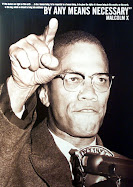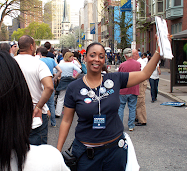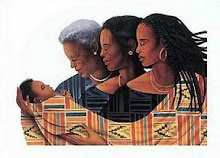Jazz poet Wanda Robinson from Baltimore released Black Ivory (named for her backing band) in 1971 on the Perception label. It offers a portrait of the artist as a (righteously) angry young woman about social mores, political injustices, and sexual politics and was produced by jazz composer and pianist Anthony Davis. The 11 cuts that make up Black Ivory are rooted by a chamber jazz group of piano, flute and saxes, bass, and a drum.
Wanda Robinson was a spoken word artist that recorded with musicians backing her up. On this album she collaborated with Black Ivory. On tracks like The Meeting Place the band is purely in the background, hovering off in the distance. On other pieces like John Harvey’s Blues there is no music at all. Suddenly Robinson and company emerge with Parting Is Such that has some rich orchestration and a little hint of Funk to it. On the Final Hour they’re able to find some Soul, again with strings and a catchy melody.
The beginning of Celebration, Compromise, Read Street Festival, A Word To The Wise, The Great American Pastime starts off sounding like its going to go all out towards the Funk, but instead mellows out when Robinson joins in for her versus. It actually does touch on the Funk for a short stretch in the middle after a drum break. Instant Replay mixes some funky Soul and spoken word elements with a rhythm track taken from one of Black Ivory’s best tunes. In comparison, on The Trouble With Dreams Grooving things get spaced out and jazzy. Wanda Robinson was a 'jazz-poet' who released 2 LPs on Perception Records. The first, 1971's 'Black Ivory' included the tracks 'Instant Replay' (which used the instrumental version of Black Ivory's 'I Keep Asking You Questions' as the music bed for one of her poems), and 'The Final Hour' (which used another Black Ivory track 'Don't Turn Around').
Wanda Robinson -- Me And A Friend (1973
I Usta Be Wanda Robinson
Among hip-hop heads and electronica kids, Laini Mataka's former self has a life of her own.
By Sarah Godfrey • July 14, 2006
Interracial dating, periods, and the quiet dignity of shoeshine men are among the things Laini Mataka has decided to discuss today. She’s giving a poetry reading at the Karibu Books outpost at the Mall at Prince Georges, and the audience is filled with teenagers, many of whom Mataka knows from her work through DC WritersCorps and as an occasional guest speaker at the Duke Ellington School of the Arts.
Of all the subjects that Mataka brings up, the one the students are most intrigued by involves their favored brand of sneaker: “Designer shoes on/Restricted feet/Nike chains/Better than shackles,” Mataka recites.
“Can you read that again?” asks one young man, and Mataka does. She then reaches out to pat the knee of a kid wearing Air Force Ones who has slumped down in his seat. “I’m not talking about your Nikes, baby,” she says.
Mataka moves on to other topics: health, genocide, black pride. In one of the last poems she reads, she talks about hair. The slight woman, in African dress, discusses the political significance of her own long locks, and how, for many, locking hair has become merely cosmetic.
“Every time conscious people do something to distinguish themselves, others come along and copy it,” she tells the students. “And then we have to find something new.”
Two books of Mataka’s poems are on sale at the Karibu reading, Bein a Strong Black Woman Can Get U Killed!! and Never as Strangers. At the very bottom of the cover of Never as Strangers is a small parenthetical: “(i usta be wanda robinson).”
That was back “when I was young and crazy,” the 56-year-old Columbia Heights resident says. As Robinson, Mataka recorded two spoken-word albums, 1971’s Black Ivory and a 1973 follow-up, Me and a Friend. Both were released by New York label Perception Records, whose roster included Shirley Horn, the Fatback Band, Dizzy Gillespie during his funk period, Astrud Gilberto, and Baha’i saxophonist James Moody. When Black Ivory was released, it made Billboard Black Albums chart, peaking at No. 29.
Robinson was a contemporary of the Last Poets and Maya Angelou, and she seemed poised to follow the same career trajectory. But she virtually disappeared after recording Black Ivory, fed up with show business and no longer willing to offer the world her words for what she calls “less than chump change.” She left the record business, worked at various odd jobs, and continued to write. In 1972, she shaved her head and changed her name to Laini Mataka. A year later, her second album was put out by Perception—but without her involvement.
Every once in a while, she’ll catch a snippet of her old work. A Miss Black America contestant recited one of her pieces for the pageant’s talent competition. Electronica and hip-hop artists delve into her recordings for samples. In 2002, a compilation of tracks from both Perception albums came out as The Soul-Jazz Poetry of Wanda Robinson. Last year, the records were re-released individually by Breathless, a reissue label that specializes in such hipster-certified obscurities as acid-folk band Comus and UK Afrobeat group Demon Fuzz.
The poetry has made it all over the world, in ways Mataka never imagined. “It did do what I wanted it to, in terms of reaching people,” she says. She’s just worried about what kind of shape it’s in by the time it gets to them. Poems have been chopped up and repurposed. Details of her life and recordings have been misstated. Most of her current fans probably suspect that she’s dead—or that she disappeared, mysteriously, long ago.
“You know who I hear is buying a lot of my [work]?” she asks. “White boys. I can’t understand why they would be attracted to it.”
As told by music historians and vinyl collectors, Mataka’s history isn’t extensive: It ends right after the release of Me and a Friend. “Just about nothing is known of Wanda other than what she wishes you to know,” writes British soul magazine editor David Cole in the liner notes to Soul-Jazz Poetry. When he’s informed of the current whereabouts of the poet, Cole says that he’s “glad to learn...that she is still alive and writing.”
To be fair, Cole had little to go on other than a Robinson-penned “about me” insert in the Black Ivory LP. “Try feeding the name ‘Wanda Robinson’ into an Internet search engine and you’ll find that her work has got through to some of the hip-hop merchants and even, on occasion, been subject to sampling,” Cole writes in his notes. “Try looking her up under ‘Black Poetry’ and it’s to no avail. Yet Wanda’s writings are every bit as relevant as those of other black activists like Maya Angelou or Nikki Giovanni.”
Cole goes on to discuss his first encounter with Robinson’s music, the tracks “The Final Hour,” and “better still (if ‘better’ can be the operative word for something that plunged me into the depths of depression)...‘The Meeting Place,’” a poem about a forlorn pianist that, he says, starts off Black Ivory “like a blow to the guts.” “Everybody has a story to tell/Yet nobody listens,” Robinson reads with authoritative urgency. “So they come every night/Hoping to get what they need/Without having to say that they need it.”
The nonfanboy history of Wanda Robinson is, of course, more detailed. She grew up in Baltimore, one of 10 children, and was raised by her grandmother. Her first paid writing gig was composing letters, at a quarter apiece, for girls whose boyfriends were being sent to Vietnam. She wrote about, she says, “things I knew nothing about”: “It was all about love—‘Oh, he broke my heart!’”
As the war progressed and Robinson entered college, her work became more political. After hearing R&B singer Arthur Prysock’s poetry-based 1969 album, This Is My Beloved, she decided to set some of her poems to music. “I heard that and said, ‘I can do that,’” Mataka says. She read poems into a tape recorder with a stereo playing in the background, then played the finished product for her classmates at the Community College of Baltimore. A local DJ, Anthony Davis, played some of her work on his show. Soon after, she got a call from Perception, which asked the 20-year-old if she would like to come to New York to cut a record.
When Mataka was picking music for her album, the label opened its entire library to her. “They said to use any music I wanted—they owned the rights to everything,” she remembers. She selected a great deal of material from Black Ivory, a soul trio from Harlem—and then walked into what she describes as a sort of disorganized, never-ending party. She remembers label folks keeping artists working however they could. “Whatever you wanted, they would get it for you,” Mataka says. “They asked me what I liked, and I told them, ‘Nothing.’”
After recording Black Ivory and performing doggedly to promote the record—at a beauty pageant, on an episode of Soul Train she never saw—Robinson fled, feeling overworked and underpaid. “I hid,” she says. “I said I’d never give my work to white people again, and I didn’t.”
She went home to Baltimore, where she put in time at the CSX railroad, in libraries, and in a warehouse. (“I was the only woman there—in a dress, lifting boxes,” she recalls.) She didn’t want to deal with labels or producers or agents anymore, but, encouraged by friends, met with a guy who’d worked with Maya Angelou. They took a cab ride, he put his hand on her leg, and she got out and didn’t take any more meetings.
In the meantime, Mataka says, Me and a Friend was cobbled together from tracks she’d recorded for Black Ivory. Although she’s never listened to the whole recording, she did once read the lyric sheet. “They didn’t know what I was saying,” she says. “They spelled words wrong.”
Still, the disc has done a lot to maintain her profile among the crate-diggers. DJ Shadow sampled Robinson’s “Nobody in His Right Mind” for his “Shadow’s Legitimate Mix” of an early-’90s track by Zimbabwe Legit, a hip-hop group founded in Harare, Zimbabwe. British electronica duo Pressure Drop used sections of “John Harvey’s Blues” on its 1997 Elusive album. New York house producer Floppy Sounds took a good chunk of “Paranoia” for “Complex,” a track on his 2001 LP, Short Term Memories. Robinson’s unmistakable voice intones, “Talking politics to a friend/We hear strange noises on the phone/And laugh/It won’t be long now.”
And those are just the credited uses. Patrick Adams, who was head of A&R for Perception until 1974, says he’s kept track of who’s used Robinson’s work over the years. When Perception went bankrupt, in the mid-’70s, the catalog was purchased by former Black Ivory manager Lenny Adams. When he died, the Sanctuary Records Group bought rights to the label’s entire output. Even so, Adams thinks that Mataka might be able to regain some ownership of her work.
“I wasn’t privy to the details of her contract with Perception,” Adams says. “I don’t know who owns the sounds copyright and the publishing copyright, but they should have an obligation to pay her as a writer.” Adams, who worked with the likes of Eric B. & Rakim and Salt-N-Pepa post-Perception and has been nominated for induction into the Dance Music Hall of Fame, adds that he’s surprised that the woman who used to be Wanda Robinson is no longer recording—and that he would love to work with her again. “She was a rapper before there were rappers,” he says.
A few years back, Mataka says, she and Adams engaged in a brief correspondence. She remembers that he talked about her work being an important precursor to hip-hop. “He was saying, ‘You have no idea how many rappers have used it.’
“I said, ‘You’re right. I have no idea.’”
In the mid-’70s, Mataka met Paul Coates, owner of Baltimore’s Black Classic Press. Once he began the process of starting a publishing house, he told her that if she waited for him, Black Classic would publish everything she ever wrote. Coates made good on his promise. In 1988, the press released Never as Strangers. In 1994, Restoring the Queen. 2000 brought Bein a Strong Black Woman.
“I know that she’s the real deal,” says Coates. “Even 30-plus years ago, her voice was a unique and original voice—and it still is....Even today, there are many Laini imitators, and they don’t even know they’re imitating her.”
But there’s one book that Black Classic hasn’t published. In the liner notes accompanying the original release of Black Ivory, which haven’t been changed in reissues, there’s a portion that reads, “The poems on this album are excerpts from The Daze of Wine...Without Roses, a book of poetry by Wanda Robinson.” Mataka says the book doesn’t exist—it was never published. “I was thinking about publishing it now,” she says.
She’s also allowing herself to be gradually coaxed back into recording. Last year, a friend paid for her to go into the studio and read over music. “The equipment was so state-of-the-art,” she recalls. “I was almost intimidated. If we’d had that equipment at Perception, it would’ve been a day’s work.” She’d like to release the sessions on CD someday. If that goes well, she’d like to try singing, too.
“When the money is right, I want to take vocal lessons,” Mataka says. “I want to mix it up—start a song, then stop in the middle, like a jazz musician, and run a poem. Then pick up on the other side. I don’t think anyone else has done that—I think I could do very well.”
In the meantime, she’s continuing to work with young writers, constantly composing poems, and trying to finish up a novel about a childhood boyfriend who was killed. That last project, she admits, is giving her some trouble: “It needs a happy ending,” she says. “And I don’t know anyone who’s having one right now.”CP
Sistas/poet Laini Mataka
This is a poem that speaks of the
Lack of quality Black Man in the
Black community for many many
Reasons.the unseen hand of
Racism White Supremacy is in
Factor in it as well;therefore
She says that man sharing at
Point will have to come into
Play or some sistas will be
Without there very own mr.
Wright.poem by poet
Laini Mataka color me poetry
Wanda Robinson - The Un-hero
A Praise Poem by Laini Mataka
HALF STEPPING THRU HISTORY
A Poem By Laini Mataka about our ancestors, slavery and today's generation












































